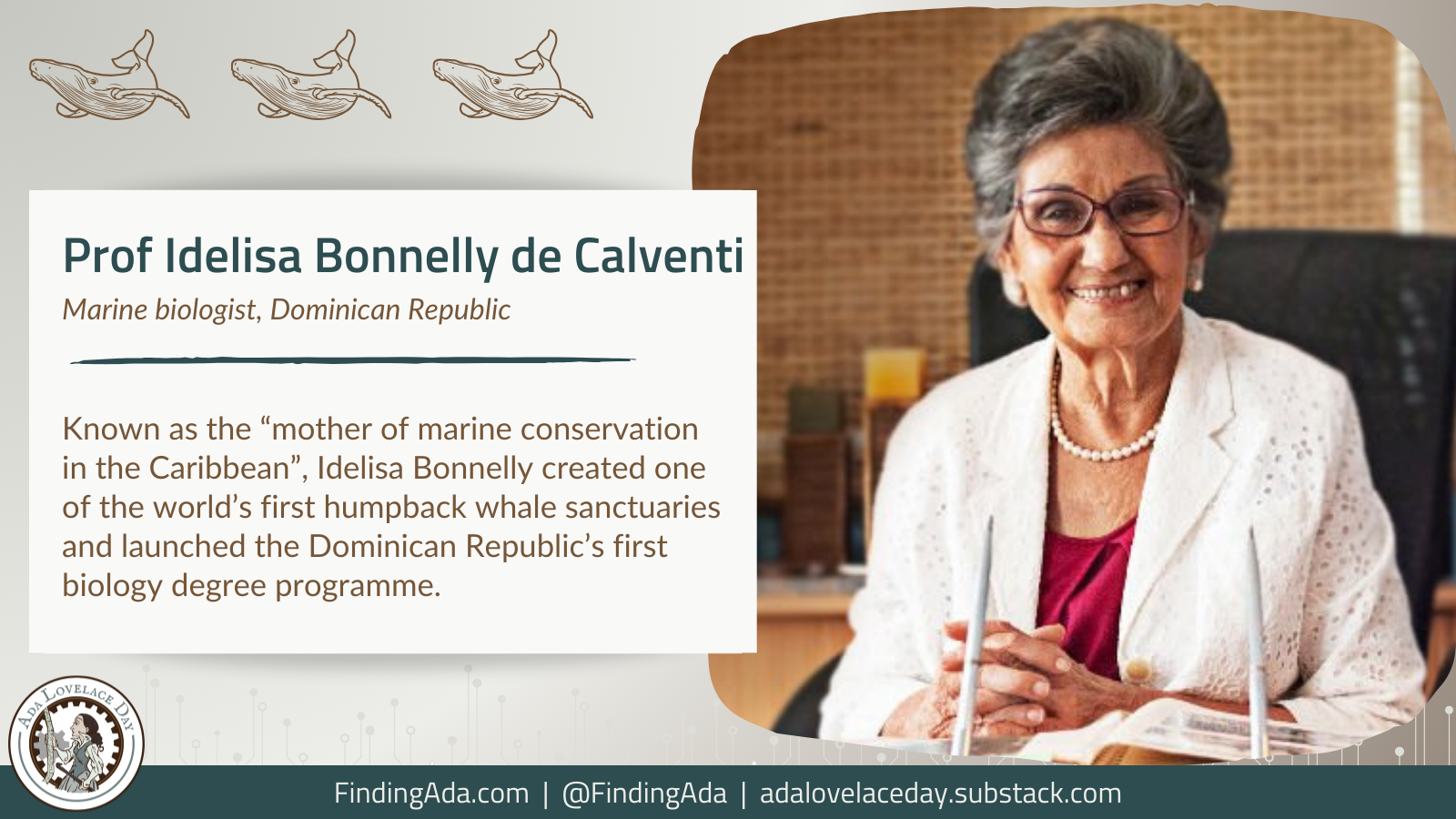Professor Idelisa Bonnelly de Calventi
Idelisa Bonnelly de Calventi was a marine biologist who pioneered the study of marine sciences in the Dominican Republic and created one of the first sanctuaries for humpback whales. Dubbed the “mother of marine conservation in the Caribbean”, she dedicated her career to protecting ocean biodiversity.
Bonnelly was born on 10 September 1931 in Santiago de los Caballeros, a city in the Dominican Republic. Reflecting on her childhood in 2010, she observed that she had always loved animals and “lived very close to the sea, which I saw as a challenge, a mystery that I wanted to unravel”.
Marine biology was not taught in Dominican universities when Bonnelly left school, and so she upped sticks for New York City, graduating with a BSc from Columbia University in 1956 and a master’s from New York University in 1961. During her postgraduate studies she worked as a research assistant in the lab at the New York Aquarium, monitoring the health of species including penguins and walruses.
When Bonnelly returned home, her lifetime’s mission – understanding and protecting the marine ecosystems surrounding the Dominican Republic – began in earnest. In 1962, she created the country’s first institute for the study of marine biology, now the Marine Biology Research Center (CIBIMA) of the Autonomous University of Santo Domingo (UASD). She launched the Dominican Republic’s first biology degree programme four years later, and founded the nation’s Academy of Sciences in 1974.
When CIBIMA was first established, there was scant knowledge about how to manage ocean resources. However, Bonnelly could see that coastal areas around the Dominican Republic were deteriorating, while species were diminishing in number. CIBIMA spearheaded vital research on coastal wildlife, including studies to establish closed fishing seasons and improve the quality of marine food.
Over the course of Bonnelly’s career, many of her scientific papers helped inform environmental laws and became influential in the field of marine conservation. In 1986, for example, her research played a vital role in the creation of the Humpback Whale Sanctuary of the Banco de la Plata, the first such sanctuary in the North Atlantic. She was also known for her skill at building strong relationships with national Dominican institutions and marine science departments at other Caribbean universities.
Bonnelly became a professor emerita at UASD in 1990, serving as coordinator of graduate studies in biology for two more years. In 1991, she joined the Organization for Women in Science for the Developing World and created the Dominican Foundation for Marine Research (Fundemar), which continues to promote the sustainable use of coastal marine ecosystems through research, education and conservation projects. As part of her work with the organisation, Bonnelly oversaw the Dominican Republic’s first dolphin study, and later worked on projects around climate change adaptation in coral reefs.
She published research until late in life, and was made an academic laureate of the Academy of Sciences of the Dominican Republic in 2007. Bonnelly died on 3 July 2022, aged 90. Science, she once said, “is about data, perseverance, discipline and often about love, and women know a lot about all this”.
Among many honours, Bonnelly was awarded the Marie Curie Medal from Unesco in 2009. The BBC recognised her as one of the 10 most important female scientists in Latin America in 2013, and in 2016 the Dominican Republic’s National Authority for Marine Affairs named a marine strait in her honour. Whales regularly pass through the strait, on their way to the crystalline waters Bonnelly loved so much.
Further Reading
- Idelisa Bonnelly, Wikipedia
- Idelisa Bonnelly (1931-2022), Mujeres Bacanas
- Idelisa Bonnelly de Calventi dies, Latin American News, 3 July 2022
- Idelisa Bonnelly: Dominican Republic, Odalis Mejía Perdomo, Women Scientists in the Americas, January 2013
- Reconocimiento a la Sra. Idelissa Bonelly, Revista Vita, 6 April 2010 [archived version accessed]
Written by Moya Crockett, with thanks to Stylist for their support.
